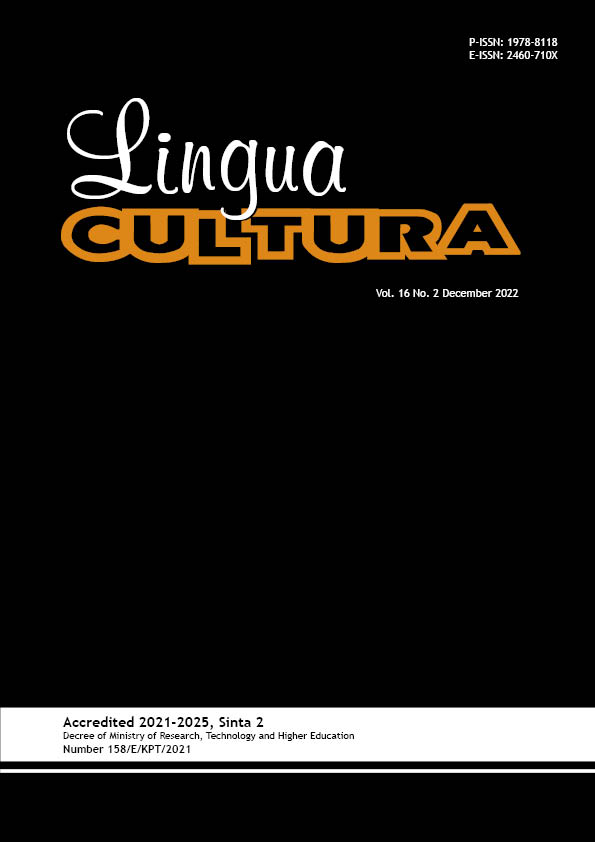Villainess Protagonists’ Performative Acts as the Representation of Modern Femininity
DOI:
https://doi.org/10.21512/lc.v16i2.8375Keywords:
villain protagonist, performative act, modern femininity, shojo webtoonAbstract
The research discussed a different representations of femininity through the villainesses and heroines in two Korean webtoons (web cartoons). Traditionally, villainesses were depicted as undesirable antagonists as they did not fit into the frame of traditional femininity or were merely viewed as sexually attractive. However, the traditional aspects of femininity were now contested by the villainess protagonists. Utilizing Butler’s theory of gender performativity along with Kress and van Leeuwen’s visual analysis, the protagonists’ and antagonists’ thoughts, actions, and appearance were analyzed. A descriptive qualitative analysis was conducted on two webtoons, The Villainess Reverses the Hourglass, and It Looks Like I’ve Fallen into the World of a Reverse Harem Game. The studied data are selected from chapters 1-45 in each webtoon. The results show that the villainess protagonists are depicted as more independent, have more power, and occasionally dress in a masculine way, while the heroines-turned-antagonists are illustrated as a dependent, lack power, and always dressed femininely. In this case, the heroines-turned-antagonists’ traits represent Korea’s traditional notion of femininity. Meanwhile, the villainess protagonists possess traits opposing the heroines’ traits. Positioning the villainesses as protagonists and heroines as antagonists show a clash of modern vs. traditional notion of femininity, and putting the ‘villainesses’ as the desirable protagonists imply how their representation of femininity is considered more favorable in the modern context.
References
Akdemir, N. (2018). Deconstruction of gender stereotypes through fashion. European Journal of Social Science Education and Research, 5(2), 185-190. https://doi.org/10.26417/ejser.v5i2.p185-190.
Ali, O. E. (2021). Visual analysis: Representational and interactive meanings in The Remarried Empress. Transcultural Journal of Humanities & Social Sciences, 2(3), 15-37. https://doi.org/10.21608/tjhss.2021.206446.
Butler, J. (2010). Gender trouble. London: Routledge.
Butler, J. (2021). Performative acts and gender constitution: An essay in phenomenology and feminist theory. In C. R. McCann, S. Kim, & E. Ergun (Eds.), Feminist Theory Reader Local and Global Perspectives (5th Ed., pp. 353-361). London: Routledge.
Clavel-Vazquez, A. (2018). Sugar and spice, and everything nice: What rough heroines tell us about imaginative resistance. The Journal of Aesthetics and Art Criticism, 76(2), 201-212. https://doi.org/10.1111/jaac.12440.
Eisend, M. (2019). Gender roles. Journal of Advertising, 48(1), 72-80. https://doi.org/10.1080/00913367.2019.1566103.
Elfving-Hwang, J. (2010). Representations of femininity in contemporary South Korean women’s literature. Leiden: Global Oriental.
Genz, S., & Brabon, B. A. (2018). Postfeminism: Cultural texts and theories. Edinburgh: Edinburgh University Press.
Hoskin, R. A., & Blair, K. L. (2022). Critical femininities: A ‘new’ approach to gender theory. Psychology and Sexuality, 13(1), 1-8. https://doi.org/10.1080/19419899.2021.1905052.
Jeong, J. (2020). Webtoons go viral? The globalization processes of Korean digital comics. Korea Journal, 60(1), 71-99. https://doi.org/10.25024/kj.2020.60.1.71.
Jin, D. Y. (2015). Digital convergence of Korea’s webtoons: Transmedia storytelling. Communication Research and Practice, 1(3), 193-209. https://doi.org/10.1080/22041451.2015.1079150.
Khan, S. A., Shahid, Z., Khan, I. U., & Rose, S. (2020). Why bloodthirsty monsters? A multimodal analysis of incorporation of the supernatural to symbolize racism and othering in webtoons. Elementary Education Online, 19(4), 4040-4049. https://dx.doi.org/10.17051/ilkonline.2020.04.764813.
Kim, T. (2020). Media’s representation of female soldiers and their femininity: A case study of Korean webtoon Beautiful Gunbari. In D. Y. Jin (Ed.), Transmedia Storytelling in East Asia: The Age of Digital Media (pp. 139-155). London: Routledge.
Mckay, A., Moore, S., & Kubik, W. (2019). Empowerment without feminism? Sexual objectification post-feminist style. International Journal of Gender and Women’s Studies, 7(1), 69-78. https://doi.org/10.15640/ijgws.v7n1p9.
Minowa, Y., Maclaran, P., & Stevens, L. (2019). The femme fatale in Vogue: Femininity ideologies in Fin-de-siècle America. Journal of Macromarketing, 39(3), 270-286. https://doi.org/10.1177/0276146719847748.
Park, J. W. B. (2019). Politicising the manhwa representations of the comfort women: With an emphasis on the Angoulême International Festival controversy. East Asia, 36(1), 37-65. https://doi.org/10.1007/s12140-019-09307-9.
Sharmin, T., & Sattar, S. (2018). Gender politics in the projection of “Disney†villains. Journal of Literature and Art Studies, 8(1), 53-57. https://doi.org/10.17265/2159-5836/2018.01.006.
Sim, H. (2020). Acting ‘like a woman’: South Korean female action heroines. Journal of Japanese and Korean Cinema, 12(2), 110-123. https://doi.org/10.1080/17564905.2020.1840032.
Storey, J. (2018). Cultural theory and popular culture: An introduction (8th Ed.). London: Routledge.
Tehseem, T., Sibtain, M., & Obaid, Z. (2018). Exploring gender stereotypes in media adverts: A multimodal analysis. Journal of Social Sciences and Humanities, 57(2), 155-175. https://doi.org/10.46568/jssh.v57i2.42.
Windsor, E. J. (2015). Femininities. In International Encyclopedia of the Social & Behavioral Sciences (2nd Ed., pp. 893-897). Elsevier. https://doi.org/10.1016/B978-0-08-097086-8.35015-2.
Downloads
Published
How to Cite
Issue
Section
License
Copyright (c) 2022 Vivian Graciela Chertian

This work is licensed under a Creative Commons Attribution-ShareAlike 4.0 International License.
Authors who publish with this journal agree to the following terms:
a. Authors retain copyright and grant the journal right of first publication with the work simultaneously licensed under a Creative Commons Attribution License - Share Alike that allows others to share the work with an acknowledgment of the work's authorship and initial publication in this journal.
b. Authors are able to enter into separate, additional contractual arrangements for the non-exclusive distribution of the journal's published version of the work (e.g., post it to an institutional repository or publish it in a book), with an acknowledgment of its initial publication in this journal.
c. Authors are permitted and encouraged to post their work online (e.g., in institutional repositories or on their website) prior to and during the submission process, as it can lead to productive exchanges, as well as earlier and greater citation of published work.
USER RIGHTS
All articles published Open Access will be immediately and permanently free for everyone to read and download. We are continuously working with our author communities to select the best choice of license options, currently being defined for this journal as follows: Creative Commons Attribution-Share Alike (CC BY-SA)


















